Bemoaning that India is not a sporting nation, tennis legend Sania Mirza has expressed disappointment at missing an Olympic medal and said that the day she and Rohan Bopanna lost the bronze medal match in the Rio Olympic Games in 2016 as "one of the worst days" of her life. Sania has won three women's doubles and three mixed doubles titles in Grand Slam besides gold medals in the 2006 Doha and 2010 Incheon Asian Games. She is the only Indian woman player to be ranked No.1 in doubles and top-30 in women's singles during a professional career that stretched for two decades -- from February 2003 to February 2023. Rohan Bopanna to End Davis Cup Career in September, Wishes to Play Farewell Game in Bengaluru.
In the Rio Olympics in 2016, Sania Mirza and Rohan Bopanna lost to Lucie Hradecka and Radek Stepanek of the Czech Republic in the bronze medal clash. "I think that if I have something in my career that I feel that I am missing is probably that Olympic medal. We came so close to it in Rio in 2016 and I don't usually cry after I lose matches, but that is something that sometimes when I think about it even today, it hurts me," Sania said in an interview with former India cricketer Veda Krishnamurthy on JioCinema original show 'Home of Heroes'
"Winning an Olympic medal for your country and for yourself and your family is the biggest dream that any athlete can have. And we came very, very close to it, we came painfully close to it. I mean, to come fourth in the Olympics is the worst. You would rather come 30th, don’t come 4th. Three gets the medal and then the fourth has nothing. So, it was very painful, it was one of the worst days of mine and Rohan’s life for so many reasons. But yes, we had to finish the match," Sania said as per a release. Sania Mirza to Take Part in Wimbledon 2023, Retired Indian Tennis Star To Play Ladies Invitational Doubles.
In Part 3 of her interview, Sania Mirza talked about resuming her tennis career after motherhood, relationship with the media and her thoughts on how India can become a sporting nation. About her 'love-hate' relationship with the media, Sania said, "I think media is not trolling, media is being media. I've had a love-hate relationship with the media. Lately, it's been more love than hate. Before it used to be more hate than love. But, in the process of that, I have made some really good friends in the media as well, what happened was I think that initially when I came, everybody was taken by surprise because there was no other woman athlete that was a star.
"And so it was a fun ride for both of us. I think they were learning. I was bouncing off them. They were bouncing off me. It got boring at some point to talk only about forehand and backhand. So, they started talking about what I wore, who I had and didn't have dinner with, why did I have dinner. So, I guess they needed to sell their newspapers and I needed to protect my sanity. But over time, we've begun to like each other more and we have a great relationship now," Sania was quoted as saying in the release.
Sania said she had realised while facing media scrutiny in a career spanning two decades, that some media persons talked about her attire for eyeballs and that it did not affect her as her parents backed her. "I was not conscious at all. I think that a lot of it was also media created because it got boring to talk about one same girl, every day playing forehands and backhands, so how much will they want to talk about it? So, it got boring and they wanted to make it spicy and a lot of my issues that happened with me in my early years were a lot of media created, unfortunately. And that is just the way it was. And I was never nervous. And that is because I had my parents. I knew no matter what, they had my back. And I think that is where my parents came where they had this solid grounding for me where I believed, regardless of anything that happens in my life, this core that I have will never go in the form of my friends and family and stuff. So, I was never scared to do anything because I always knew they had my back."
Asked what needs to be done for the country to have another Sania Mirza, the Hyderabad-born tennis legend said that could be done only by changing the entire culture, investing in sports and putting in place a system that would nurture kids from a young age. We cannot become a sporting nation four months before the Olympics and then be a sporting nation four months after and then that's it for four years. We are not a sporting nation. We are a cricketing nation. And people don't like it when I say that. But that's the truth. And sometimes you have to hear the truth to make a change. We are not somebody, especially when a girl is born, we don't say, ‘Let’s make her an athlete.’ That is not what is said at all. If you go to Australia, that is a sporting nation where you are going and watching any sport and it’s packed."
"So, first, we have to change the culture, second, we have to get a system in place and third, we need to nurture kids from the age of eight, nine, ten and not wait for them to become something and then invest money in them or invest time in them. Also, I think it's very important that we have the right kind of coaches and trainers, whether that's brought in from outside to train the people that we have here or just bring in people from outside to nurture these kids that you are identifying, that will be your tomorrow," said Sania, who is married to Pakistan cricketer Shoaib Malik and lives in Dubai.
Sania also talked about her motherhood, she said having a child when she was in top-10 of the world doubles rankings was a well-thought-out decision, her decision to return to the circuit with her son in tow, and how she lost 26 kilos of weight in four months and went on to win her first tournament in Hobart, Australia. "For me, it was not just about proving to myself that I have tennis left in me at the highest levels. It was also, like I said, setting an example that as young mothers, your life doesn't get over because you have a child, it’s the beginning of life.
"And just because you put yourself forward does not make you a bad mother. It doesn't make you a bad person or a bad woman. It makes you human. And if a man can do that without thinking twice about it, then why can't a woman do it? So, that was a couple of motivations that I had. And when people are saying I can’t do it, then I have to do it. Like there is no way we are not doing that. That was the inner rebel in me," said Sania.
(The above story first appeared on LatestLY on Jul 06, 2023 11:18 PM IST. For more news and updates on politics, world, sports, entertainment and lifestyle, log on to our website latestly.com).



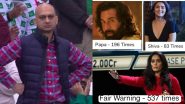


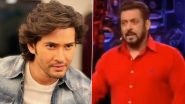






 Quickly
Quickly









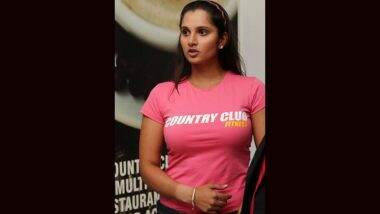
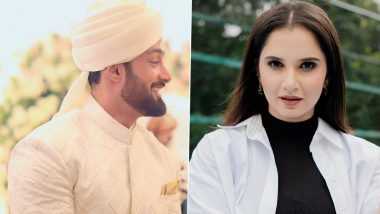
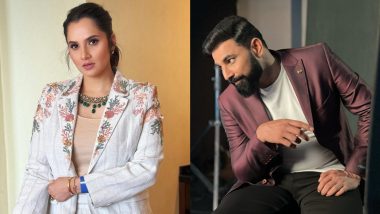

 GT
GT







